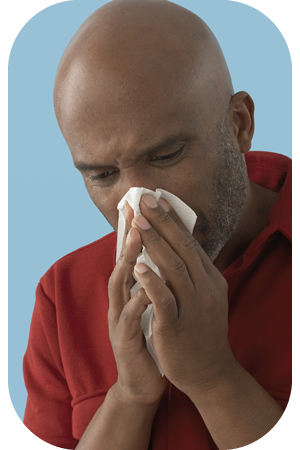Cancer and the Flu
Everything you wanted to know about the flu shot when you're facing cancer

Whether you're a cancer patient in active treatment, a cancer survivor or a friend or family member of a person with cancer, flu season is upon us once again. Flu season lasts from October through May ad often peaks in January and February. The Rogel Cancer Center receives many questions about influenza this time of year, especially about how flu can affect treatment and whether patients should get a flu vaccine.
We sat down with pharmacist Shawna Kraft, Pharm.D., from the U-M Rogel Cancer Center Symptom Management and Supportive Care Program to talk about what patients, survivors and loved ones need to know, common myths and tips for staying healthy this flu season.
Q. What is influenza and what are its symptoms?
According to the Centers for Disease Control and Prevention, "Influenza (flu) is a contagious respiratory illness caused by influenza viruses. It can cause mild to severe illness." Some people, such as people with cancer, are at higher risk of flu complications that can result in hospitalization or even death. Symptoms can include fever, cough, sore throat, body ache, headache and fatigue. Though it’s more common in children than adults, some flu patients have vomiting and diarrhea.
Q. Should cancer patients in active treatment get a flu shot?
YES!
Q. Why is getting a flu shot so important for cancer patients?
Cancer patients often have compromised immune systems and are at increased risk of complications if they do get the flu. The flu vaccine lowers the risk of death and complications from the flu.Q. Are there specific types of cancer patients who should NOT get a flu shot?
No, everyone should get the flu vaccine.
Q. Is there a certain time cancer patients should receive the flu vaccine?
Preferred timing with chemotherapy is at least two weeks prior to the first treatment. If currently receiving chemotherapy, it should ideally be administered at the furthest possible time point away from treatment during a given cycle. However, timing should not prevent someone from getting a flu shot and the vaccine may be given at any time during the patient's chemotherapy cycle.
Q. What about cancer survivors?
Yes, cancer survivors should get vaccinated. The CDC recommends that everyone over 6 months of age receive an annual flu vaccination.
Q. Are cancer patients more likely to get the flu than others?
We don't know that specifically but we do know that since cancer patients have a compromised immune system, their risk is higher and the complications from flu are more likely.
Q. What exactly is a flu vaccine?
Each year, health professionals research what strains of flu will be most common during the coming flu season. A variety of drug companies develop vaccines that cause antibodies to build up in the body, resulting in better protection against infection. There are egg-based, cell-based and recombinant (genetically made) flu vaccines. All must be developed according to regulations by the U.S. Food and Drug Administration.
Q. What type of flu vaccines should people with cancer get?
All patients should receive vaccination with quadrivalent inactivated influenza.
Patients should NOT receive vaccination with live attenuated influenza vaccine, also referred to as LAIV. This is the nasal spray version of the vaccine.
Q. What about family members of cancer patients?
People in the same household and close contacts should be vaccinated based on CDC recommendations, preferably with an inactivated influenza vaccine. Vaccination with live attenuated influenza vaccine (LAIV) should be avoided by anyone in contact with immunosuppressed patients who are hospitalized and receiving care in a protected environment (i.e. bone marrow transplant or leukemia patients).

Q. What about anti-viral medication such as Tamiflu and Relenza?
These medications may be appropriate for some patients who have a confirmed flu infection and are generally safe for cancer patients. Ask your doctor first.
Q. What are some common myths about cancer and the flu shot that you’d like to debunk?
You cannot get the flu from the flu vaccine, especially the inactivated flu vaccine. The risk of death and complications from the flu is more concerning than the possibility of fever or muscle pain from the injection itself. Since flu season is often during a time of increased respiratory infections, many think they have gotten the flu without a confirmation that it is the flu from their doctor’s office. Most likely it’s a different viral infection.
Q. What tips can you offer to prevent getting the flu?
First, get a flu shot every year. Be sure to wash your hands often. Don't touch your eyes, nose or mouth. Do your best to stay away from other people with the flu. If you’re sick, stay home to prevent spreading the infection to other people.
Q. How should a Rogel Cancer Center patient go about getting a flu shot?
Talk to your cancer care team about scheduling yours.
Continue reading the Fall, 2014 issue of Thrive
